Article 75: Coffee and the development of philosophy
Throughout history, coffee and cafes have created the ideal environment for the formation of contemplations about life and spurred people to discover comprehensive truths about life.
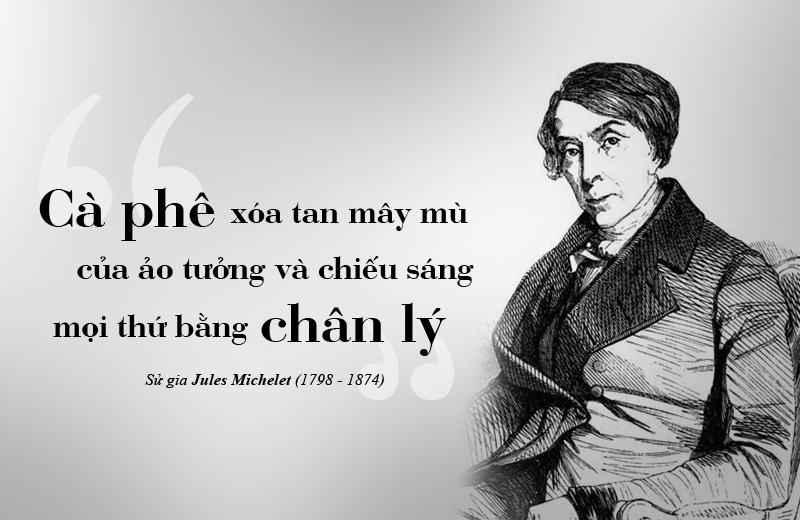
“Coffee clears the clouds of the imagination and illuminates the reality of things with truth.” – Jules Michelet (1798 – 1874)
Coffee – discourse of life
Philosophy arose when people began to search for an argumentative answer to life in all its manifestations, and constantly sought the truth to live wisely and happily. Philosophical schools and systems have been shaped when philosophers constantly present, argue, and dialectic around views to rationally answer questions.
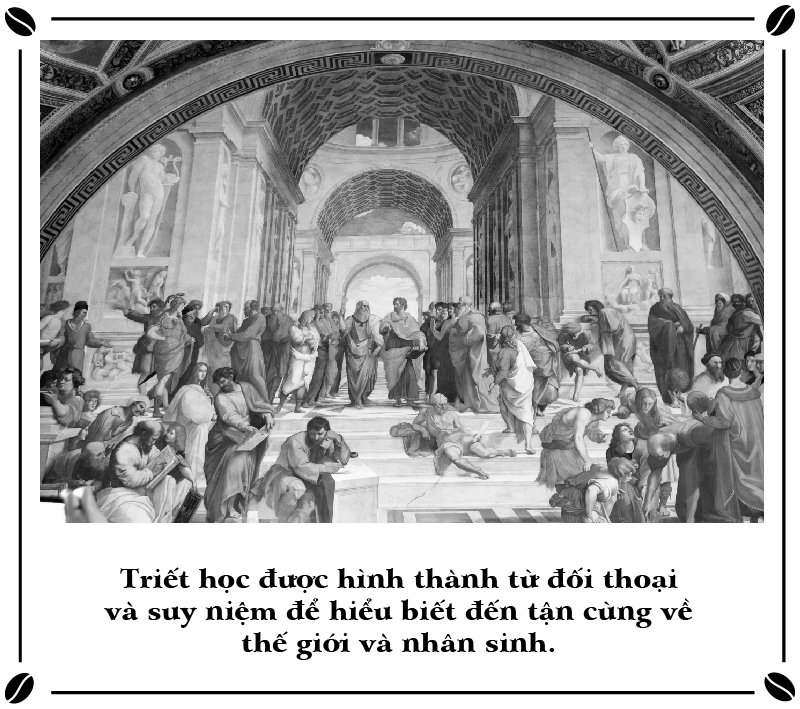
Philosophy is formed from dialogue and contemplation to understand to the end the world and human life.
An important term in philosophy is Logos, which comes from the Greek word “λέγω”, which translates to “I speak”. Logos has been used in philosophy since the time of the Heraclite philosopher (about 535 – 475 BC) with many meanings, which can be understood as wisdom, creative power, supreme reason, universal law, or it is just ordinary speech… It can also be understood that “I speak” – Logos is a form of wisdom, as Heraclite argues, “wisdom consists in speaking the truth”.
Philosophers have considered speech-dialogue necessary for the development of philosophy. Philosophers themselves are also people who dare to speak, dare to openly use their reason in all matters. At the same time, they always know how to listen to others. From the 4th century BC, Socrates – the father of ancient Greek philosophy discussed philosophy on the streets of Athens. In his talks, Socrates breaks down the problem into a seamless system of questions and answers that will gradually lead to the truth. After him, famous philosophers such as Plato, Aristotle, Epictetus, etc. have also discovered universal truth through dialectical dialogues that summon the wisdom of many people.
According to that dimension, the nature of the cafe has become a place for people to talk to each other, about each other, for each other. Because only in coffee shops are people awake enough to talk about themselves and listen to others. From the convergence around coffee, people have directly questioned the problems of the world, about the role of people and how people should live. Through coffee, people talk about themselves and all the dynamics that make them human.
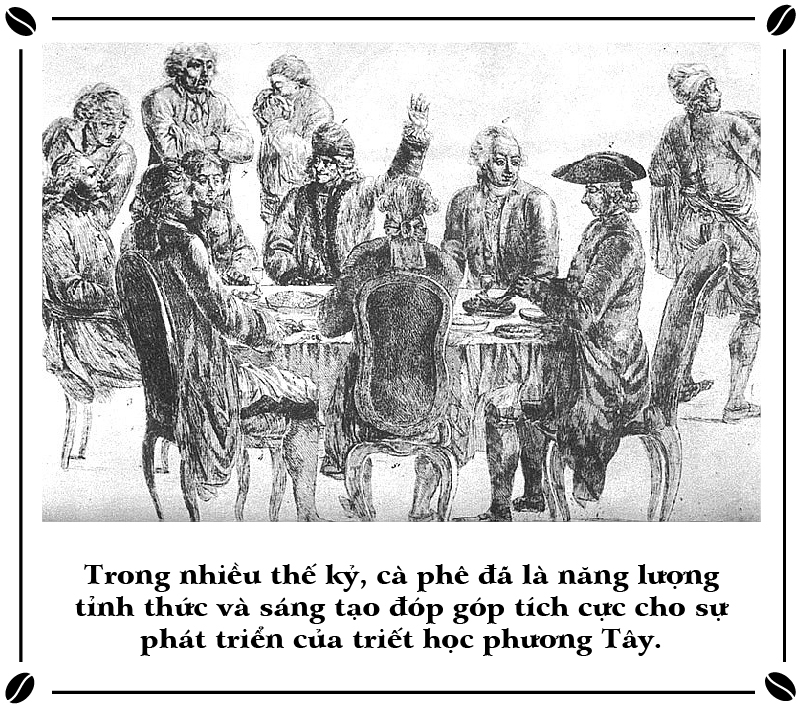
For centuries, coffee has been an awakening and creative energy that has actively contributed to the development of Western philosophy.
Thus, it is no coincidence that most of the philosophers who were influential in the birth of philosophical schools have always considered coffee a necessary drink. Philosopher Francis Bacon, the founder of empiricism, once wrote in Historia Vitae et Mortis that “Coffee gives life, wisdom and courage”. Philosopher Immanuel Kant, the most influential man in modern Western philosophy, always demanded coffee on time to stay awake to carry out the tasks of the day. One of the founders of modern political philosophy – Thomas Hobbes regularly participated in discussions in cafes in Oxford (England), where he expressed support for the basic principles of liberalism. And in the office of Søren Kierkegaard – the first philosopher of existentialism there would be at least 50 sets of cups and plates to make coffee in his own way…
Coffee shop – convergence space for great souls
If coffee is a drink that sublimates the intellect and is the energy that drives philosophers to pursue the truth, then coffee shops have provided the ideal space to form theoretical knowledge systems, playing an important role in the birth of major philosophical schools.
In the 17th – 18th centuries, the brilliant period of the Enlightenment movement, the coffee shop was a regular gathering place for philosophers, writers, and scholars to participate in discussions to open up new streams of thought. In France, Café Procope was the place where great philosophers such as Denis Diderot, Voltaire, Montesquieu, Le Rond d’Alembert, Jean-Jacques Rousseau… discussed ways to improve the world with the power of knowledge. Café Procope was also where the enlightened philosophers wrote the famous Encyclopédie, synthesizing the knowledge of the times to change the way people think. Renowned in the history of philosophy was also Café de la Régence, where the historic meeting between Karl Marx and Friedrich Engels took place in August 1844. The two men found the same ideological and viewpoints in all theoretical and practical issues, thereby collaborated to pursue the founding research career of scientific socialism.
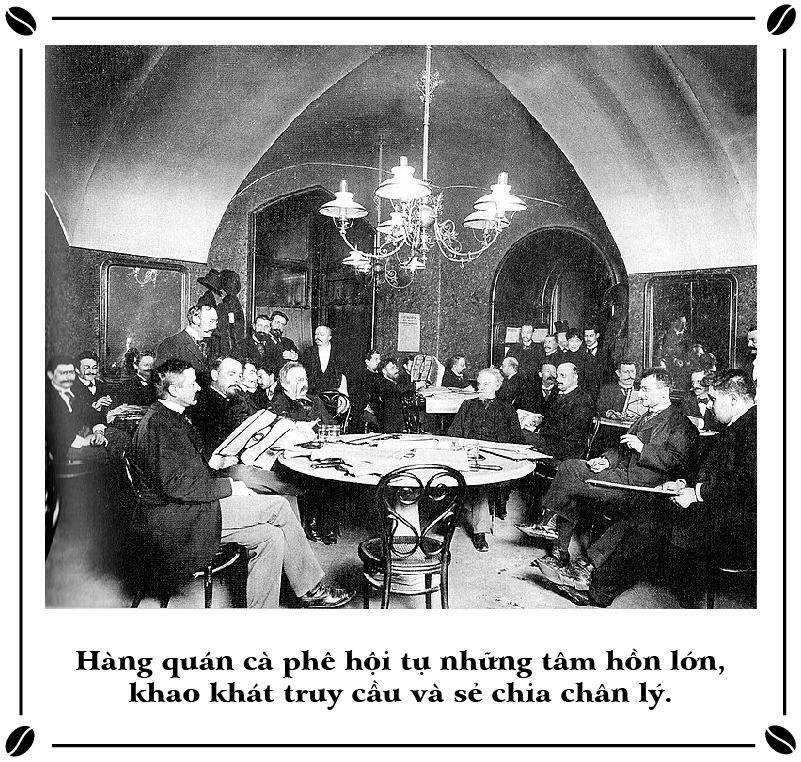
Coffee shops converge great souls, longing to seek and share the truth.
The 20th century, a vibrant period with great spiritual adventures. Among the important breakthroughs of 20th-century philosophy were the birth of logical positivism, philosophy of language, and existentialism. These are philosophies that were initiated by academic discussions in cafes, typically from the Vienna Circle and the Berlin Circle.
The Vienna Circle was a group of philosophers and scientists who sought to reinterpret philosophy scientifically with modern logical means. The group organized weekly discussions at cafes in Austria such as Café Reichsrat, Café Central, Café Arkaden, Café Josephinum… The issues raised for debate were contributed ideas and perfected into new philosophical theories. Prominent in them, the philosopher Moritz Schlick founded the school of philosophy of logical positivism, Ludwig Wittgenstein explored the concepts of linguistic nature and epistemology, laying the foundation for the transformation of the philosophy of language.
Similar in nature to the Vienna Circle, the Berlin Circle group was founded in 1926 in Germany with a focus on exploring philosophical issues in specific fields. Berlin Circle called its philosophy logical empiricism, to distinguish it from the logical positivism of the Vienna Circle. Berlin Circle members met at Café Dobrin in Germany and some cafes in Vienna. The group contributed many achievements in mathematics, physics, natural sciences, especially probability theory, mathematical logic and theory of relativity.
From the second half of the 20th century was the development of existentialism, focusing on analyzing the meaning of each person’s existence through lifestyle, commitment and personal responsibility. The beginning of the existentialist movement was Søren Kierkegaard – a philosopher who drank coffee as a living ritual, then exploded strongly in Europe. Many existentialists considered academic philosophy too abstract and separate from concrete human experience, and they chose cafes as places to meditate, discuss, and write. Café de Flore was considered the headquarters of Jean-Paul Sartre and Simone de Beauvoir. Les Deux Magots, La Closerie des Lilas were also gathering points for existential philosophers.
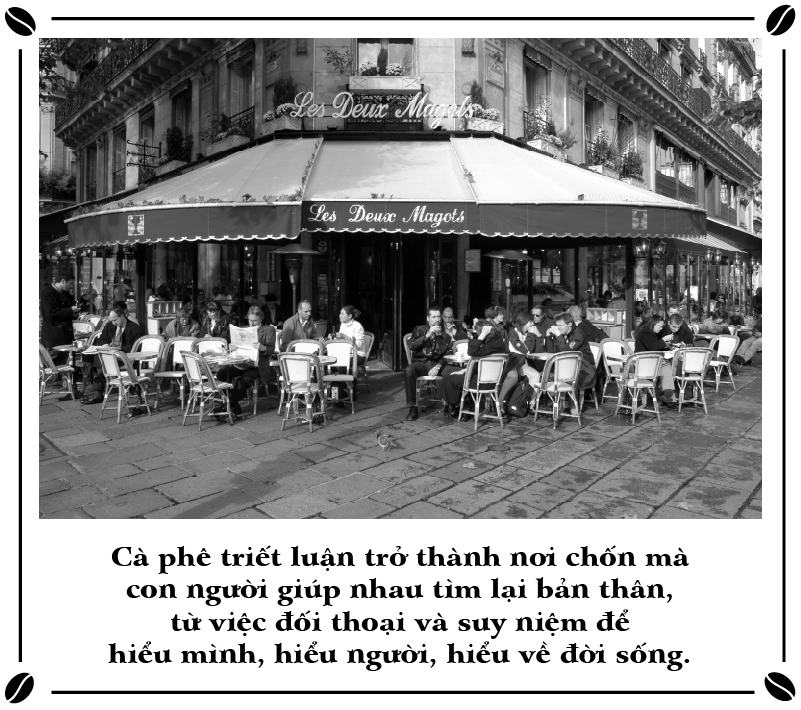
Philosophical café has become a place where people help each other find themselves, from dialogue and reflection to understand themselves, people, and life.
The philosophy is developing on the basis of great intercultural dialogue with the spirit of openness and mutual respect. In this process, the kind of philosophical cafe that started in France at the end of the 20th century spread around the world with names like Café philosophique, Café-philo, Socrates Café, etc. bringing philosopy to the street, such as Socratic method, to help people understand the way to find the meaning of life. The questions in the coffee shop were images of philosophical stories from the beginning with Socrates’ thesis of “man know thyself”, going through the awakening of the enlightenment century to the transformations in contemporary philosophy to shed light on questions about the universe and humanity.
It can be said that the essence of meeting in a coffee shop to chat is an expression of “civilization of dialogue”, expressing at the highest level the philosophy of each person’s life. In other words, a coffee shop is a space where people themselves perfect their philosophy of life by being able to dialogue with themselves and others, increasing the meaning of human existence so as to not only live but to live in truth – goodness – beauty.
THE REAL COFFEE
ROASTED ONLY FOR PEOPLE OF WISDOM!
Source: “The Philosophical Way of Coffee” – copyright by Trung Nguyen Legend


